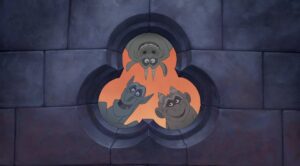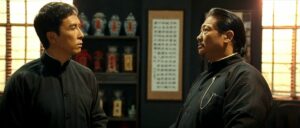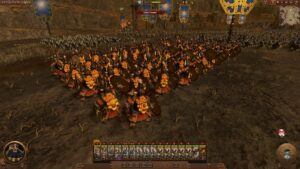Self-awareness is a form of cinematic grace. A filmmaker’s knowing wink toward the audience can go a long way, particularly when an established property is in play. Used to excess, self-awareness can just look like cheap fan service, on the level of “Rey Skywalker” or “What are we, some kind of suicide squad?” But at its best, it suggests that some creators recognize the limitations of narratives, and take the chance to play within their organic boundaries. That’s exactly what the Mortal Kombat film reboot does best.
Intentional cinematic self-awareness looks like the Fast and the Furious franchise, which spent 20 years getting its audience used to ever-more-outlandish heists, until sending cars into space seems as natural as a quarter-mile race. Failed self-awareness looks like the live-action Mulan explaining away its female protagonist’s self-resilience and independence through some mythical chi force and an unexpected affection for nationalism. Giddily satisfying self-awareness looks like Simon McQuoid’s new take on the Mortal Kombat universe, which includes a remix of the 1995 film’s techno theme song by The Immortals, a dagger made out of frozen blood, and Kung Lao’s Hat Grinder fatality whizzing a person’s body apart. Does a guy yell, “Mortal Kombat!” at some point? Yes, he does!
Leaning into nostalgia can be a lazy tactic, and an uninteresting one. After a certain point, seeing another pale imitation of something you once loved doesn’t provide nearly the same thrill as the original. But the 2021 Mortal Kombat does well by avoiding a beat-by-beat replication of Paul W.S. Anderson’s initial cinematic adaptation of the video game whose violence so spooked American parents that it was the focus of congressional hearings in 1993 and 1994. Instead, the script from Greg Russo and Chinese-American screenwriter Dave Callaham (who also co-wrote the upcoming Shang-Chi and the Legend of the Ten Rings) modifies certain elements enough to set Mortal Kombat on a new narrative path while also honoring the franchise’s extensive mythology.

The film’s primary protagonist is an entirely original character. A few character backstories have been tweaked. And the explanation given for the fighting prowess of Earth’s champions is satisfyingly small-scale. “Look inside yourself” has been a component of martial-arts films for so long that it fits right into Mortal Kombat, which opens with a banger of an intricate, brutal fight scene, and concludes with another equally impressive display from assistant fight choreographer Anthony Rinna and fight coordinator Chan Griffin. In the middle, Mortal Kombat goes a little haywire: The pacing is slightly off, the requisite training portion drags, and there are some dialogue clunkers. (“You’ve been chosen to fight for Earth!” “There is nothing for you here, only death!”) But in terms of the elements that matter most for a movie of this type and in this lineage, Mortal Kombat rises to the challenge.
The film begins in the 17th century, when the idyllic life of Japanese warrior Hanzo Hasashi (Hiroyuki Sanada) is interrupted by the grudge-bearing assassin Bi-Han (Joe Taslim). Intertitles then inform viewers of the Mortal Kombat tournament between the oppositional Earthrealm and Outworld. If Earth loses one more showdown, the planet will fall to the savage rulers, monsters, and champions of Outworld, who will enslave the human race. The final complicating factor: A prophecy claims that a new group of Earth fighters will be united by Hanzo’s blood. That suggestion reignites the rivalry between Outworld sorcerer Shang Tsung (Chin Han) and thunder god Lord Raiden (Tadanobu Asano), who is tasked with defending Earth from Outworld’s forces in the years between tournaments.
In the present day, washed-up MMA fighter Cole Young (Lewis Tan) is approached by Jax (Mehcad Brooks), a Special Forces service member who takes special note of the dragon-shaped birthmark on Cole’s chest. Every so often, Cole has visions and dreams of a fiery figure reaching toward him from what looks like Hell — and the strangeness of that image is matched by an attack on Cole and his family by the Outworld villain Sub-Zero, who can control and manipulate ice. That altercation leads Cole to Jax’s Special Forces colleague Sonya Blade (Jessica McNamee), who informs him of the enmity between the Earthrealm and the Outworld. “They spelled it wrong!” is Cole’s groan-worthy reaction to Sonya’s explanation of the interstellar duel. But by the time a gigantic humanoid lizard tries to kill them, Cole is on board.
Quicker than the acid spit of the villainous warrior Reptile can burn a hole through human flesh, Cole, Sonya, and the Australian mercenary Kano (Josh Lawson) are on their way to Raiden’s temple for training as Earth’s champions. Who they meet there and what they learn about their “arcana” — the secret motivators that activate and fuel their superpowers — takes up more time than Mortal Kombat strictly requires, but it also allows each character a chance in the limelight.
As cousins Liu Kang and Kung Lao, actors Ludi Lin and Max Huang are double-take-worthy recreations of their video game avatars; kudos to costume designer Cappi Ireland for her interpretation of their 2D outfits. Outside of aesthetics, though, they make an impact with the former’s blunt sincerity and the latter’s deadpan sarcasm, both of which spark against Lawson’s enjoyably psychotic Kano. As the film’s most straightforwardly “good” characters, Tan, McNamee, and Brooks use their broad-shouldered physicality to communicate upright morality.
But they aren’t stiffs: McNamee’s Sonya clearly gets a fair amount of glee from “accidentally” stabbing the irritating Kano in the leg with his own dagger, and Tan’s Cole comes alive when his character faces off against a certain many-armed monster. And on the villains’ side, Kabal (portrayed by Daniel Nelson and voiced by Damon Herriman) should be a fan favorite for his smug self-assurance, while the immensely talented Han pulls off the impossible task of making Shang Tsung’s soul-sucking look regal and foreboding.
Which brings up the most important element of any Mortal Kombat adaptation: the fights! The film’s R rating earns its keep through the film’s technical flourishes: the unsettling sound of a dagger crunching on bone; the jarring beauty of blood and rain mixed together on flower petals and leaves; the laugh-out-loud grossness of a beating heart being pulled out of someone’s chest. The key here is tone, and Mortal Kombat is thoughtful with it. That first fight with Sanada and Taslim is the film’s most emotionally weighty, and the stakes of the well-shot and well-edited clash carry through the remainder of Mortal Kombat.
And this is an intelligent decision: McQuoid lets the amusingly despicable Kano deliver some of the silliest grotesqueries, and treats the Earth champions’ fatality moves with a combination of wonder and catharsis. That might be a strange observation to make about a film that equates exploding someone’s skull with a moment of personal liberation. But that go-for-broke violence has always been a core component of Mortal Kombat, and this reboot succeeds because McQuoid and his team remember that, and have the self-awareness to acknowledge it. It isn’t a flawless victory, but it is lizard-brain fun.
Mortal Kombat opens in theaters on April 23 and is streaming exclusively on HBO Max through May 24. Before visiting a theater, Polygon recommends checking our guide to local theater safety.
Source: https://www.polygon.com/reviews/22398053/mortal-kombat-review
- American
- April
- Assistant
- audience
- Beauty
- BEST
- BLADE
- blood
- board
- body
- cars
- challenge
- checking
- claims
- component
- Dave
- day
- Designer
- dreams
- faces
- fair
- family
- FAST
- Figure
- Film
- films
- First
- flower
- Focus
- form
- Franchise
- Fuel
- fun
- game
- grinder
- Group
- guide
- here
- HTTPS
- ICE
- image
- Impact
- ireland
- IT
- Key
- LEARN
- Level
- local
- Long
- love
- Making
- mixed
- MMA
- moves
- movie
- opens
- parents
- People
- planet
- present
- property
- protagonist
- Race
- reaction
- Sarcasm
- Self-Awareness
- Series
- set
- So
- streaming
- Technical
- Theater
- theme
- time
- tournament
- Tournaments
- Training
- treats
- United
- Upright
- Video
- W
- WHO
- within
- years









